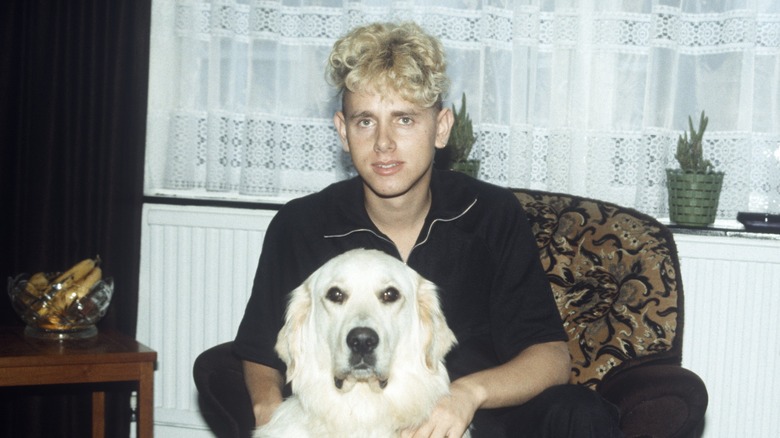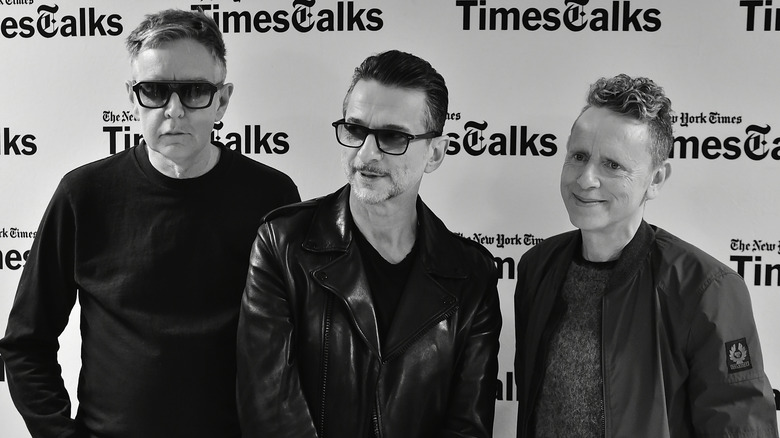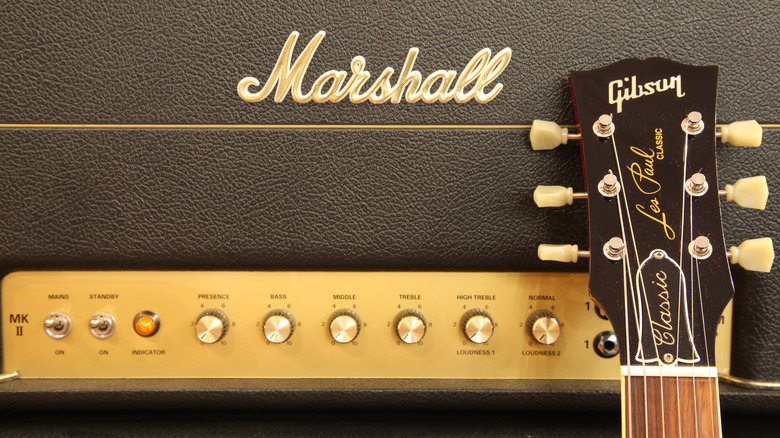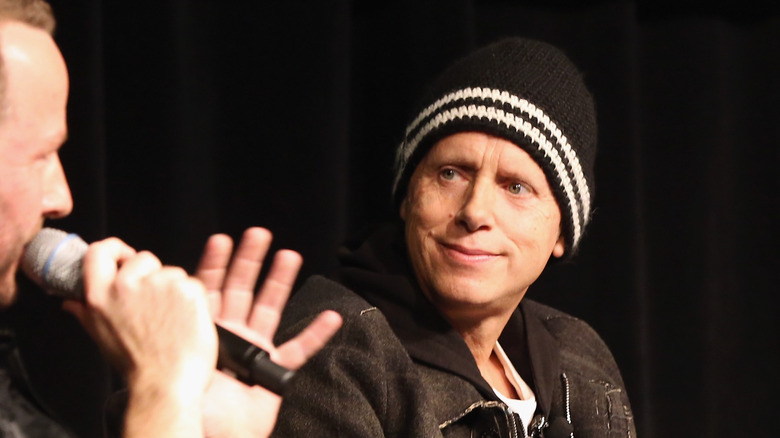The Untold Truth Of Depeche Mode's Martin Gore
In 2017, Bloomberg reported a stunning set of figures about the world's premiere synth-pop band 40 years and running, Depeche Mode. They're the only band in history to sell out the Hollywood Bowl four consecutive times, beating out the Beatles and Luciano Pavarotti. Their rabid fan base — The Black Swarm — hounds them across North America and Europe, particularly Germany, and drives ticket sales past contemporary acts like Ed Sheeran, Justin Bieber, and Bruno Mars. Their discography is 14 studio albums and 100 million in record sales strong (per Official Charts), and the tour for their last album, 2017's "Spirit," garnered over $200 million in ticket sales, per Ticketing Business News. Yet, they've never had a No. 1 single, ever; Depeche Mode's appeal has been as slow-burning as it's been long-lived.
Frontman David Gahan gets a lot of attention — and rightfully so — as he struts around on stage in absolute, self-possessed confidence, crooning in his deep-bellied baritone. His long, torturous history of substance abuse, attempted suicide in 1995, and actual clinical death for two minutes in 1996 tends to grab the media's eye, as well. But much like the subtler layers of Depeche Mode's own music, it's the quiet background that deserves equal acclaim. Ever since Vincent Clarke left Depeche Mode following the breakout success of their first album, 1981's "Speak and Spell," Martin Gore took over as songwriter. Receded and quiet, but steeped in pathos, Gore has crafted and curated Depeche Mode's signature, brooding, thick sound.
An introverted child bored with suburbia
In a 2013 interview with iHeart Radio on YouTube, Gore — born Martin Lee Gore in 1961 — talks about his first, mind-opening exposure to music at age 10 when he found a bunch of his mom's classic rock 45s (7-inch records). He cites something mysterious about music, some allure that he couldn't quite figure out, that attracted him to play and compose. And it's true: In many ways Depeche Mode's entire catalog sounds like an undeciphered enigma.
Gore grew up in several small towns about 30 minutes east of London — Dagenham, Hornchurch, then Basildon — and disliked them all. There wasn't much to do except go to school — which Martin actually loved, especially learning languages — and escape through music. In Gore's words, as stated on Depeche Mode Biography, he "suffer[ed] from a suburban outlook" and didn't go to his first concert until the age of 17 despite London being so close. He describes his family life as stable, and himself as "a strange child" who mostly stayed in his room reading "fairy-tale books." Both his mom and dad worked at the same Ford car factory. Gore himself worked a "mind-crushingly dull" bank job for a year and a half after finishing high school.
In 1979, Gore joined Vince Clarke and Andrew Fletcher to form the Basildon-based, synth-and-keyboard group Composition of Sound, per All Music. In 1980, they brought Dave Gahan on board and changed their name to Depeche Mode.
The songwriting backbone of Depeche Mode
Even though Gore typically sports a guitar on stage these days — he has a veritable arsenal of guitars, in fact, mostly Gretsch (he reviews some of his collection on YouTube), some Les Paul, his "star guitar" from the 2017's "Spirit" tour — Depeche Mode is chiefly an electronic band. Sure, they've gone through a multitude of phases and adopted more instruments into their live shows, but they began as a computers-and-synths New Wave band. As their sound shifted to "post-modern blues" (as a 1997 Guitar World archived article on DMRemix puts it) mixed with "electro-sleaze" (fantastically stated on Uncut) starting, arguably, with 1997's "Ultra," Gore started reincorporating his teenage, guitar-driven songwriting into the mix.
And make no mistake: Gore writes everything. Gahan is the voice (he's helped write a mere three songs over 40 years, per Secondhand Songs), and Alan Wilder does the "screwdriver" work, filling in the electronic and musical puzzle and doing a lot of backend, production labor (as well as performing). It's a method that's worked and might have helped keep Depeche Mode together through their aforementioned drug-and-near-death phase, particularly the mid-90s when fans would throw bags of drugs on stage, per The Guardian.
Albums such as "Music for the Masses" (1987), the early crowning achievement "Violator" (1990), and "Songs of Faith and Devotion," (1993) — sporting Gore-written songs such as "Personal Jesus" and "Enjoy the Silence" — elevated Depeche Mode into the limelight, where they've basked ever since.
A true gearhead and tonal perfectionist
Let's be clear: Martin Gore loves gear. He's accumulated so much of it, in fact, that he has his own shop on Reverb, based in Chicago, where folks can buy his own, personal, used gear (there's also things like signed CDs, as well). There's everything from Roland drum machines to synths, rack units to amps, with some items pushing $1,000 or more. And sorry, folks — at the time of this writing, every single item has been sold. All sales go to the nonprofit Notes for Notes, which operates after-school programs where kids can make music for free.
Other backstage videos from Depeche Mode concerts, such as this one on YouTube from the Staples Center in 2013, and this other one on YouTube from 2010, feature Gore's guitar tech Jez Webb taking viewers on a close-up, detailed tour through the meticulousness of Gore's tech. In a nutshell, Gore employs very particular pedal-amp-cabinet loops and effect combinations for each and every song. Change-ups and ad-libs can be made on the fly during shows.
It's clear from the equipment alone, even aside from Depeche Mode's musical palate, that Gore is a perfectionist when it comes to tones. Even by 1990's "Violator," as DMRemix cites Guitar World saying, Gore's writing had come to include "lyrical nylon-string melodicism, snaky blues patterns, slide and sizeable amounts of distortion." The band's shift to L.A. and exposure to musicians such as Trent Reznor may have played a part here.
A father of five concerned about ecological catastrophe
Of course, Martin Gore isn't all about music (at least when he's not). He's got five children — four daughters and one son — as he talks about in a very thorough interview on The Quietus. Gore's shift to fatherhood reflects in Depeche Mode's music, as well, particularly 2017's "Spirit," which highlights our impending ecological crisis, particularly the track "The Worst Crime." As Gore says, it's "a song about humanity hanging itself and the worst crime being the destruction of the planet," continuing, "we are not just doing it to ourselves, but we're also doing it to future generations."
Alone these lines, Gore, a Santa Barbara resident, wasn't silent about his concerns regarding the former Trump administration — the "Muslim ban," the repealing of Obamacare, and so on — anymore than he was silent about his feelings about Brexit. He states that he would have voted Remain had he not moved to the U.S., stating, "I really think that people were fooled. A lot of people believed in the idea that all the money that was going to be saved from the EU was going to go to the NHS. It was a lie."
In another interview with The Guardian, Gore states that it's "baffling" that members of the extremist alt-right, such as Richard Spencer, like Depeche Mode. "We don't agree on anything the alt-right stand for," he says, noting that any of Depeche Mode's lyrics contradict anything resembling an alt-right philosophy.
A singularly creative musical pioneer and artist
Like many creative people, Gore doesn't like to be limited to single projects. Depeche Mode's output has been consistent since their 1981 debut, but Gore has still found time for other projects. In 2012, he reunited with his former bandmate and synth pioneer Vince Clarke for a project titled "VCMG" to produce a pressure-free collaboration, "Ssss" (they discuss their email-based, remote back-and-forths in an interview on YouTube). He also, as Depeche Mode Biography states, wrote a solo tribute to renowned musician Leonard Cohen, did some vocals for the band Motor, and worked on solo LPs, EPs, and singles.
Most recently, as we can see on Martin Gore's personal website, Gore released his 2021 EP "The Third Chimpanzee" (the album shares its title with a 2006 book about human evolution by "Guns, Germs, and Steel" author Jared Diamond). "The Third Chimpanzee," listenable on Spotify, is a scratchy, crackling soundscape of experimental guitar work and noises — framed within a melodic superstructure — that sounds exactly like what you'd expect: an outré outtake from a Depeche Mode record with limited restraints from record labels and sales expectations.
In an interview with Consequence, Gore states that he loves all types of music and is confused by how "people just want to sound like everything else that's around right now." This makes complete sense, because not only does Gore's solo work not sound like anyone else's, but, thankfully, neither does anything Depeche Mode has ever released.





